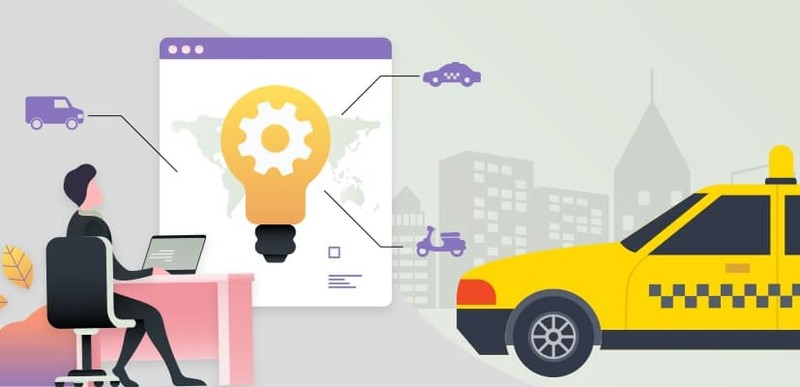While the cities across the globe race up to be the super-power within their countries, the term “liveable cities” goes on a toss. For any city to be so, it needs to be congestion-free and provide clean, convenient on-road environments to its residents.

And one of the ways for sustainable development is to include the Shared mobility plan in the city’s expansion. This is something that has the potential to redefine the way the next-generation look at the inter-city and intra-city transportation.
It is a concept of sharing the means of commute with other residents. Just like public transport, it leverages the taxi transportation industry growth.
Here are some of the crucial ways through which the taxi app development company can contribute by making applications for shared mobility. One way to do so is to include the rideshare option in the cab booking solution itself.
Shared transportation for employees
Introducing shared transportation for employees is a great way to bring a change in carbon emissions and even reduce employee stress. A vehicle, with planned pick up and drop, can easily replace around 3 vehicles on road.
This is the reason why sustainable shared mobility is a new way to look at local and short-distance transportation.
Alternatively, it offers a great solution for the workforce to reduce their daily commute expenses. There are a plethora of environmental pros of shared mobility by introducing taxi management software for the corporate transportation process.
It can use cloud-based technology at an enterprise level whereby the shared transportation works on the taxi dispatch system. And gradually having it rely on IoT can also help employees and the involved transportation team connected.
Car sharing – an effective commuting solution
Long ques at a toll or the signal – more cars ultimately create traffic congestion on road and delays the commuting time. Considering the car usage in the most populated country like China, there were around 235 million cars in China. This leads to adverse effects in climate as it pollutes the air to a great extent.
The climate change effect on China is evident. And as a solution, the car-sharing option makes a lot of sense especially because many families may have more than one car, keeping others at home does no good. Putting it up on sharing by equipping it with a cab booking solution can contribute significantly to the taxi transportation industry.
Another lucrative option is to utilise the unused car for the roundtrip-car sharing where the client can return the car to the same spot where they started. This where you return the car to the point you have started.
On one hand, it helps cut down the adverse environmental effects while making the commute easy and cheap for the resident commuters. Taxi booking software does not require any big investment like that of buying a car and maintaining it with timely service and refuel it.
Shared mobility is a great way to reduce the loan burden and still helping the local economy to flourish.
Cities to drive the future of shared mobility
Transiting through cabs is one way that city people are used to nowadays, courtesy tax app development. And in the coming times, major cities have the advantage of having used the cab booking solution and adopting the ride-sharing option easily.
It can make way for regulating the shared mobility ecosystem by ensuring that shared communities mutually benefit from this. For the ride-sharing app owners, the equity issues need to tackle. The key is to ensure that everyone in the shared mobility ecosystem is given the same services without the discrimination towards how many miles they travel when sharing a ride.
Another aspect for the companies roping in taxi dispatch system is to ensure that not only the rich get their private cars in place while commuting but also the poor need to have an affordable yet convenient option of mass transit.
The growing population in the cities calls for prioritizing the shared mobility system. And since more people use fewer cars, the road space it occupies is minimum.
Consider how a Lyft Line or and Uber pooled car with three passengers will eat up less of road space as compared to the individually hired car for a one-way commute.
With the time, the laws to promote such shared rides are highly encouraged as a way to prioritize the space-efficient modes of travelling within the cities, at least during the peak hours where traffic towards a single direction is quite common.
Congestion-free roads during peak hours
That being said, there are already a lot of cars moving on the road during peak hours. Another alternative for that is to employ shared bikes for mobility. On the background, it works on the same taxi business software but for bikes.
The idea is to set up the cab booking solution for multiple vehicles including shared motorcycles which allows relatively faster movements and creates less congestion during the peak hours.
Another great way is to rent a bicycle and pay by use. Integrated GPS can track the distance travelled and charge accordingly from the users. Electronic bikes are also a great way to move towards bettering environment.
Giving daily commuters with a few options apart from cars that reduce traffic is a great way to integrate a taxi dispatch system to other means of transportation for shared mobility services.
Leveraging cloud technology through mobile
With shared mobility gaining a lot of traction in first world nations, the other countries are fining lucrative options to blend in taxi dispatch solution for the shared mobility transportation.
Cloud technology along with the Internet of Things which demonstrates the use of electronic and wireless technologies can significantly contribute to the taxi transportation industry.
The gain is for those involved in the automobile manufacturers, city civic programs and even venture-backed startups along with the car rental companies to offer better cab booking solution to city commuters.
Technology has evolved to a stage of wider and larger physical networks enabling mobile applications to multitask. This has changed the way people travel including the revival of the taxi booking system.
Read More: The most comprehensive Mobility Solution for a taxi business.
It has brought the conventional taxi business to life by introducing taxi management software at city-level, internationally. The success of Uber and Lyft speaks volume of how people across the globe have adopted this in their daily lives.
Cloud-based technology which that relies on GPS can also let the user alter their commuting routes based on real-time traffic they anticipate on the road further. The immediacy of crucial information like approximate fares and real-time departure and arrival is a valuable addition to the conventional commuting system.
The shared mobility solutions can make the most out of available options that cloud technology has enabled for those looking to simplify their daily commuting – faster, cheaper and convenient.
Users have multiple shared mobility options enabling them to pick the most efficient way of commuting on that particular time.
Real-time access to the last mile and first mile solutions while commuting.
Contributing to the green economy by reducing the road traffic while also picking up the shortest route to reach the desired destination.
Shrinking down the transportation cost by harnessing community growth.
Negating the need to buy or own the vehicle solely for daily commute as shared mobility offers a rather cheaper and efficient way to travel. It also spares people from taking loans, paying interests and spend more on maintaining their cars.
Special shared mobility options for physically-abled people can work wonders for those who need extra care while travelling.
The way ahead for the shared mobility
Taking the shared mobility business ahead largely depends on how taxi booking app development companies can address major customer pain points. For example, strangers sharing the same ride does not make one comfortable.
Sharing personal space is something that few people are particular about. Creating a community and a group based on the travel route provides a great way for people to commute with friends.
Carpooling can be fun when you know people, so integrating the social element within the app can motivate people to use the shared mobility option.
Travel smart with taxi booking apps.
A highly configurable cab booking solution can work as a central control point for transport operators as well as the vehicle owners. Blending in the scalability, which largely depends on adaptability, can make way for a rather modern unified interface for the citizens to choose their commuting options.
The ride owners should not overlook regulatory matters and keep their vehicles compliant. Over-loading or dated engines for shared mobility is a strict no-no. Rather, efforts should be directed towards mitigating the commuters risk while ensuring the drivers’ safety for every ride they take.







